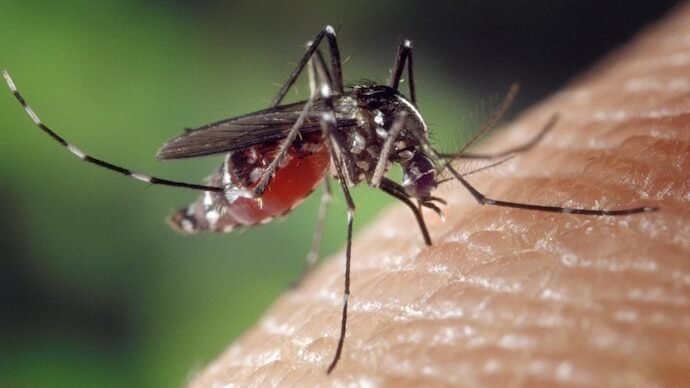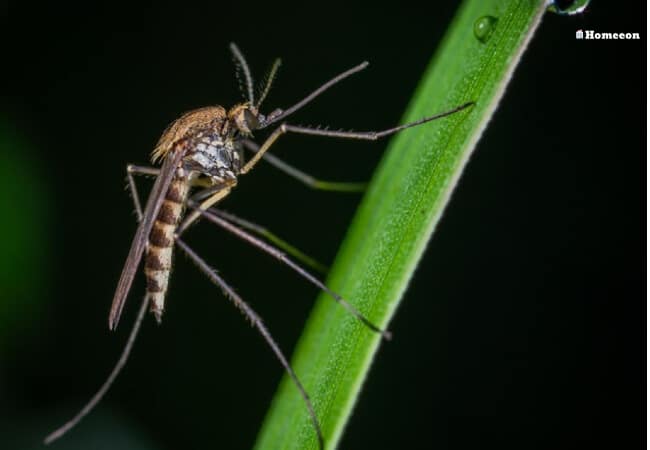Last Updated on August 16, 2023 By Emma W. Thomas
To repel mosquitoes from your home:
- Eliminate standing water where they breed.
- Install screens on doors/windows.
- Use mosquito nets or repellents with DEET or picaridin.
- Employ natural remedies like citronella or eucalyptus oil.
Techniques of warding off mosquitoes according to our research

- Destroy all mosquito breeding sites
- Use natural ingredients to repel mosquitoes from your compound
- Invest in mosquito traps for your yard
- Use bug lights and yellow LED lights to keep mosquitoes away
- Wear chemical mosquito repellant on your skin
- Sleep under a treated mosquito net at night
- Use a mosquito swatter to slap stationary mosquitoes in a room
- Plant mosquito-repelling herbs such as garlic and lemongrass in your yard
- Destroy all mosquito breeding sites
Most times, mosquitoes come to our homes looking for places to lay and hatch their eggs. Stagnant water and long grass or shrubs are the best breeding grounds for mosquitoes. For you to effectively eliminate these insects from your home, you need to drain any stagnant water and keep the grass short by mowing regularly. It is also essential to get rid of places where little water can accumulate, such as old tires, empty flower pots, or clogged troughs. For larger pools or puddles that cannot be completely drained, use a larvicide to kill mosquito larvae. Always remember to trim shrubs, bushes, and grass often so that mosquitoes don’t hide and breed there.
- Use natural ingredients to repel mosquitoes from your compound
As much as we want to get rid of mosquitoes, we must ensure we use products that are safe for children, pets, and the environment. Most chemical repellants and sprays contain harmful DDT, which is a threat to the environment and our health. Instead of chemical insecticides, you can burn citronella oil or candle. Smoke from citronella is effective in keeping away mosquitoes. If you don’t have access to citronella, you can burn essential oils. The most effective essential oils in repelling mosquitoes are lemon, eucalyptus, and lavender. To burn essential oils and release sent in the air, get an oil burner, then mix water and oil, then use a candle to heat the mixture. Mosquitoes cannot stand that smell, and they will stay away from your house. When using these methods, be sure to put several burners in different areas where mosquitoes frequent often.
- Invest in mosquito traps for your yard
Technology has seen the emergence of mosquito-trapping gadgets that use carbon dioxide and heat to attract mosquitoes and then kill them. If you live in a mosquito-prone area, you might want to buy one such gadget. Not only are they efficient, but they are also hands-free, making it easy and stress-free to get rid of mosquitoes. For those people who enjoy chilling in the yard, but mosquitoes get in their way, then these gadgets are a must-have. These trapping systems are a bit pricey compared to other methods, but they are long-term and worth it.
- Use bug lights and yellow LED lights to keep mosquitoes away
Mosquitoes tend to stay away from low-intensity light, such as yellow LED lights. Scientists are yet to confirm the theory behind this, but it works, and that is what matters. If you want to effectively ward off mosquitoes, use yellow lights in the corridors, near the doors and windows. These will keep mosquitoes away from hanging around your house or getting in. You can also use bug zappers to electrocute the mosquitoes that come near the light. Bug zappers have been proven to be less effective in areas with many mosquitoes. You can use them if you don’t have so many mosquitoes in your yard.
- Wear chemical mosquito repellant on your skin
When going outdoors, protect your skin from mosquito bites by applying mosquito repellant. Always check the ingredients of a repellant before applying it to your skin to avoid harmful components and allergens. The most effective repellants are those that contain 30%-50% DEET and can be used by both adults and children above three months. Some repellants also contain picaridin, which has a pleasant feel, is odorless, and safe for both adults and children. If you are not comfortable using chemical repellants, then oil-based repellants are the best for you. Oil-based repellants contain essential oils that are known to repel mosquitoes. Cinnamon oil, castor oil, and citronella are the most reputable oil-based repellants in the market. Lemon eucalyptus oil and tea tree are also efficient when applied to the skin. A tip when using oils is to ensure you re-apply frequently after a few hours.
- Sleep under a treated mosquito net at night
Sometimes mosquitoes come into our rooms through tiny spaces that we are not aware of. We need to take extra precautions to protect ourselves from mosquito bites. We can do this by ensuring we sleep under a mosquito net each night. Drape the net all around the bed and tuck it in to ensure no mosquito can get it. Always check the net regularly for holes or tears that can allow mosquitoes in. You should also cover pet sleeping areas with mosquito nets to protect them. Mosquito nets can also be used to drape a baby’s stroller when going outside to a mosquito-infested place.
- Use a mosquito swatter to slap stationary mosquitoes in a room
If you’ve ever been interrupted from your fun activity or short nap by a stray mosquito, then you already know that you need a mosquito swatter. This is a handheld gadget that resembles a tennis rack but with a thick metal shell and a flexible wire mesh. The device is effective for slapping mosquitoes that manage to get into your house after applying all repelling measures. Squatters make it easy to hit mosquitoes without having to squash them in your hand. These devices cannot be used as the only method to ward of mosquitoes. However, they are useful in killing a few mosquitoes that stick persistently to any surface.
- Plant mosquito-repelling herbs such as garlic and lemongrass in your yard
Planting mosquito-repelling herbs is worth every effort. These herbs are fantastic since they can be used in the kitchen for cooking and, at the same time, repel mosquitoes. Several herbs have been proven effective in keeping away mosquitoes, and they include lemongrass, citronella, peppermint, basil, lavender, and marigolds. If you don’t have enough space in your kitchen garden, you can plant these herbs in vases and hang them all around your fence.
How to Get Rid of Indoor Mosquitoes

Dealing with indoor mosquitoes is a challenge that many people frequently face, especially during the warmer seasons. Mosquitoes not only cause irritating bites but also potentially carry and transmit a variety of diseases. Here are several proven strategies to help get rid of indoor mosquitoes:
1. Regularly Inspect And Remove Standing Water
Mosquitoes are known for breeding in standing water. Therefore, regularly check and remove any water-filled containers, such as flowerpots, birdbaths, or buckets.
2. Install Window Screens
Installing window screens helps prevent mosquitoes from entering the home. Ensure that the screens are fine enough to stop insects but still allow airflow.
3. Use Mosquito Nets
Sleeping under mosquito nets can provide an effective barrier against mosquito bites, especially in areas where these pests are prevalent.
4. Employ Indoor Mosquito Traps
Modern mosquito traps are efficient devices designed to attract and kill mosquitoes. Place these in dark corners of your house where mosquitoes usually hide.
5. Use Mosquito Repellents
The market offers a wide range of indoor mosquito repellents in various forms such as creams, sprays, or electronic emitters. Choose a repellent suitable for your needs.
6. Apply Natural Solutions
Many natural remedies can be effective in repelling mosquitoes. These include plants like citronella, lavender, and basil or essential oils from these plants.
7. Seek Professional Pest Control Services
If you face a severe mosquito problem that’s hard to control, consider hiring professional pest control services to handle the situation effectively.
By following these strategies, you can significantly reduce the indoor mosquito population, create a more comfortable living environment, and protect yourself and your family from potential health risks posed by these pests.
What Are the Signs of a Mosquito Infestation?
Dealing with mosquito infestations is not only a nuisance but also poses serious health risks due to their ability to transmit diseases. Being aware of the signs of a mosquito infestation can help in taking timely measures to eliminate them. Here are some common signs that may imply a mosquito infestation:
1. Increased Mosquito Activity
One of the most obvious signs is an increase in mosquito activity. If you notice more mosquitoes, especially, at dawn and dusk, you might be dealing with an infestation.
2. Mosquito Larvae
Discovering mosquito larvae on standing water sources could be another sign of an infestation. Larvae are often found in stagnant water bodies like bird baths, ponds and buckets.
3. Mosquito Eggs
Finding mosquito eggs around home is a surefire sign of infestation. Unlike other insects, female mosquitoes lay their eggs directly on the surface of stagnant water or at water edges.
4. Increasing Bites
A sudden increase in mosquito bites, especially during daytime, could indicate a possible infestation. The number of bites might increase as the mosquito population grows.
5. Persistent Buzzing Noise
If you often hear a buzzing sound, commonly made when mosquitoes fly close, it could be an indication of an infestation.
6. Presence of Stagnant Water
Mosquitoes thrive in stagnant water where they breed and lay eggs. If you have a lot of stagnating water around your house, it might attract mosquitoes leading to an infestation.
Conclusion
Let’s be sincere; no one loves mosquitoes or any pests near their home. Pests and insects that bite cause so much discomfort that we can do without them. Repelling mosquitoes is necessary, especially in the summer. To keep our spaces habitable and free from mosquitoes, we need natural remedies that do not interfere with the environment. Insecticides are effective in warding off mosquitoes, but some contain harmful ingredients. To keep away mosquitoes while protecting the environment, we need to use natural remedies more.
To keep your loved ones safe from mosquito bites and mosquito-borne diseases, you need to insect-proof your home. Getting rid of stagnant water and any breeding ground is a significant step in the right direction. You should also consider planting herbs that repel mosquitoes in your backyard or kitchen garden. When indoors, keep mosquitoes away by burning essential oils or use a swatter to slap mosquitoes that get their way into your house. Sleeping under a mosquito net is another sure way of ensuring you are not bitten in your sleep.
When going outside, be sure to wear clothes that cover your skin. You could wear long-sleeved shirts and trousers instead of shorts. Applying insect repellant is an excellent way of preventing mosquito bites. In case of a mosquito bite, you need to keep the area clean to prevent infection. To heal a bit faster, you can dap an anti-histamine after cleaning the wound. Even though insect bites feel itchy, try and avoid scratching them as this increases the risk of infection. We hope that this information is helpful to you as you get rid of mosquitoes and enjoy your summer.
References:
https://www.thisoldhouse.com/pest-control/reviews/best-ways-to-get-rid-of-mosquitoes
https://www.forbes.com/home-improvement/pest-control/get-rid-of-mosquitos/
Emma is a graduate of Domestic Science or Family and Consumer Sciences (Home Economics) from the University of Wisconsin. She has 7 years of experience Working with the strategic section of BestBuy and now writing full-time for Homeeon.
From Managing the Home, Interiors, Cleaning, and Exteriors to Gardening and everything about Making A Home Liveable – is her passion and this Homeeon is the result of this.
Emma loves decorating her home with the best stuff found online. She cares about quality over anything and writes reviews about them here in Homeeon. Get in touch with her over Pinterest.
Keep reading her blogs.
